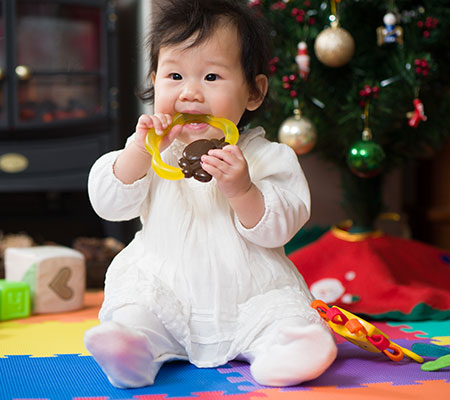
When parents don’t have luck with teething rings, they can try items they have around the house, like a cold spoon or pacifier.
Parents can expect their baby to begin teething as young as four months old. With teething comes fussiness and trouble eating.
“There are many tricks and tips parents can try to soothe a teething baby,” said Dr. Aaron Mertz, a Marshfield Clinic dentist.
Soothe teething discomfort
Pharmacies or drug stores may have teething products to help soothe your teething baby. Mertz also recommends other tricks for parents who don’t have luck with teething rings or want to use something they already have on hand:
- Your finger. Wash your hands thoroughly, and then apply pressure to and massage your child’s gums.
- Moist gauze. Moisten new, clean gauze with cold water and hold it to your child’s gums.
- Cold pacifier. Put your baby’s pacifier in the fridge or freezer for a short time before letting them use it.
- Cold spoon. Similar to a pacifier, you can use a cold spoon to put on the teething area.
- Ibuprofen or acetaminophen, when recommended. If you have trouble comforting your teething baby, talk to your pediatrician or dentist who may recommend OTC pain medication.
Do not use benzocaine or products like Orajel. Products with benzocaine may cause a baby to get a blood disorder called methemoglobinemia. U.S. Food & Drug Administration first warned of benzocaine dangers in 2006, and continues to warn parents about benzocaine and babies.
“I strongly encourage parents to stay away from products with benzocaine for teething. In worst case scenarios, such products can result in death,” Mertz said.
Bring your child to the dentist
It’s time for a dental visit as soon as your child’s first tooth comes in.
“Visiting the dentist young has many benefits,” Mertz said. “For starters, it helps your child get comfortable with us and being in a dental chair.”
At your child’s first dental appointment, the dentist:
- Teaches you how to brush your child’s teeth and the amount of toothpaste to use
- Checks for cavities and tooth decay
- Discusses with you pacifier or finger-sucking habits
Make healthy nutrition choices
A healthy diet helps to ensure your child’s teeth develop healthily.
Avoid soda. Only allow your child to have soda for special occasions if at all.
“I would highly recommend against giving your child soda, but if you’re going to, save it for special occasions,” Mertz said.
Give fruit instead of juice. Never allow juice before 1 year old, and give just 4 to 6 ounces of juice if the child is 1 to 6 years old. The small amounts of juice can be diluted with water.
Late bloomer? Talk to a provider
Some children don’t teethe until 2 years old.
Keep up with your baby well checks. Any serious concern, such as malnutrition or genetic disorders that may cause late teething likely would be determined early on by the pediatrician.
“Most of the time, late teething is nothing that should cause concern,” Mertz said. “It doesn’t hurt to talk to your provider at 18 months if your child hasn’t started teething.”
Related Shine365 stories
Protect your baby from unusual cavities
Your tot’s teeth: Start brushing habits early
Good dental health starts early

